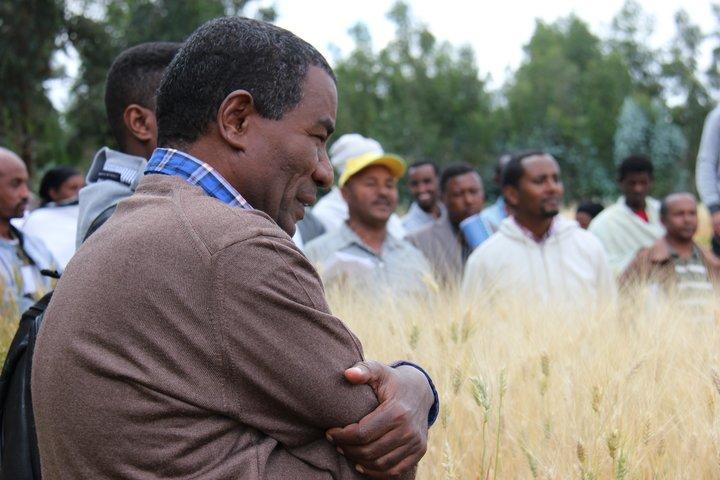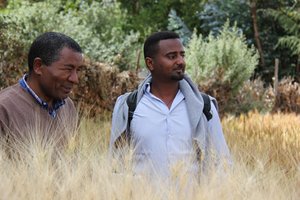Why agricultural biodiversity matters for the future of Ethiopia

On a field trip to meet farmers testing durum wheat varieties, Dr. Teshome Walle, Head of the Bureau of Agriculture, Amhara, spoke about why he thinks farmers in Ethiopia need to diversify to meet the challenges of climate change, food security and sustainable development.
On a recent field trip to the Amhara Region, to meet the farmers who are testing varieties of durum wheat as part of the ‘Seeds for Needs’ project, Dr. Teshome Walle, Head of the Bureau of Agriculture, Amhara Region (pictured left), talked to us about why farmers in Ethiopia need to diversify their crop production to meet the challenges of climate change, food security and sustainable development.
Bioversity International is working with partners in several project sites in the region to test how different varieties of durum wheat are performing against the changing climatic conditions.
How do you think agricultural biodiversity is important for sustainable development in Ethiopia?
Ethiopia is considered one of the world’s biodiversity hotspots and we know that this biodiversity is a valuable resource not just for our own country, but potentially for the rest of the world as well. It can really help us adapt to some of the challenges we are facing right now, such as climate change, and at the same time secure our sustainable agricultural development. It is a promising future science for us.
What are some of the challenges facing agricultural production in Ethiopia right now?
The biggest one is without doubt climate change. This is not just affecting us here in Ethiopia but affecting everyone, everywhere. Here, we are particularly experiencing regular rain shortages which are affecting crop production in the eastern part of the Amhara region. Our first priority is to find varieties of crops that can grow with less moisture, and at the same time, we are working intensively on natural resource conservation and improving irrigation to help us adapt to the changing conditions.
Another challenge is that we need to broaden our focus beyond just crop production, to nutrition – not just producing enough food, but the right food. According to some data, around 50% of children in the Amhara region have stunted growth because of a lack of nutrition. It doesn’t mean they have a lack of food, but they don’t have the right package of foods – such as vegetables, animal products and cereals.
Today you have been visiting the field site where the farmers and scientists are working together to test durum wheat varieties. What were your impressions?
One thing I found especially interesting today was to see how some of the farmers’ traditional varieties are outperforming the improved varieties in terms of yield, especially in these challenging conditions. We need to select those that are performing well and find ways to distribute them to other parts of the Amhara region for testing, through the agricultural extension workers.
 In addition, I was very impressed by the participatory and collaborative research activities. I have seen how the farmers, the young local researchers, and the partners – Bioversity International; the Amhara Region Agricultural Research Institute, Mekelle University, the Ethiopian Biodiversity Institute and the Scuola Superiore Sant’Anna Italy – are all working together in this research initiative which is so important for Amhara.
In addition, I was very impressed by the participatory and collaborative research activities. I have seen how the farmers, the young local researchers, and the partners – Bioversity International; the Amhara Region Agricultural Research Institute, Mekelle University, the Ethiopian Biodiversity Institute and the Scuola Superiore Sant’Anna Italy – are all working together in this research initiative which is so important for Amhara.
After visiting the field trials, you visited the community seedbank which was opened as part of the project earlier this year. Was this your first visit to a community seedbank?
Yes, I had always thought of seedbanks in terms of the national ones, handled by government institutions and big research centres. But today we visited simple ordinary farmers who are safeguarding their community’s precious crop diversity at the local level. This opens up the possibility of a comprehensive package which could be replicated elsewhere. The farmers can select the best varieties and take them to seedbank, so that they are able to access the right seeds during bad weather conditions, for example, when there is insufficient rain.
What are the key points that you have taken from today that you will share with the Ministry upon your return?
Firstly that traditional agriculture should be supported by science and research but for this to work, researchers need to work together with the farmers to identify best practices and exchange knowledge. Secondly, I have seen promising durum wheat varieties that can withstand drought and I also visited the community seedbank which is managed by the farmers at the local level. So I think we can pick some practices from that and apply it to other parts of our region.
Any final words?
I would like to forward my great and sincere thanks to all of the participants today. It is only through such joint efforts between farmers and scientists that we can make a difference. This is an exciting time for our country as we are investing in all directions, through infrastructure, development social services, and much more. Ethiopia has a big vision and our biodiversity heritage is a very important of that.
Dr. Teshome Walle joined a field visit in Meket Woreda, Amhara Region, which was held on 28th November 2015. The trip was to give participants from various organizations related to agriculture, research and development, a chance to observe how farmers’ varieties adapt to local conditions and their potential to contribute to food security.
This project was created in response to the multiple threats to agriculture and food security, including drought and extreme weather events, which are affecting smallholder farming communities in the Amhara Region. This work is being carried out through the CGIAR Research Program on Climate Change, Agriculture and Food Security.
Photo top: Dr. Teshome Walle meets with farmers at the field day to learn about the durum wheat variety trails, Amhara Region, Ethiopia. Photo bottom: Dr. Teshome Walle meets one of the young local researchers, Yosef Gebrehawaryat Kidane, who is working on the project. Credit: Bioversity International/S. Collins
